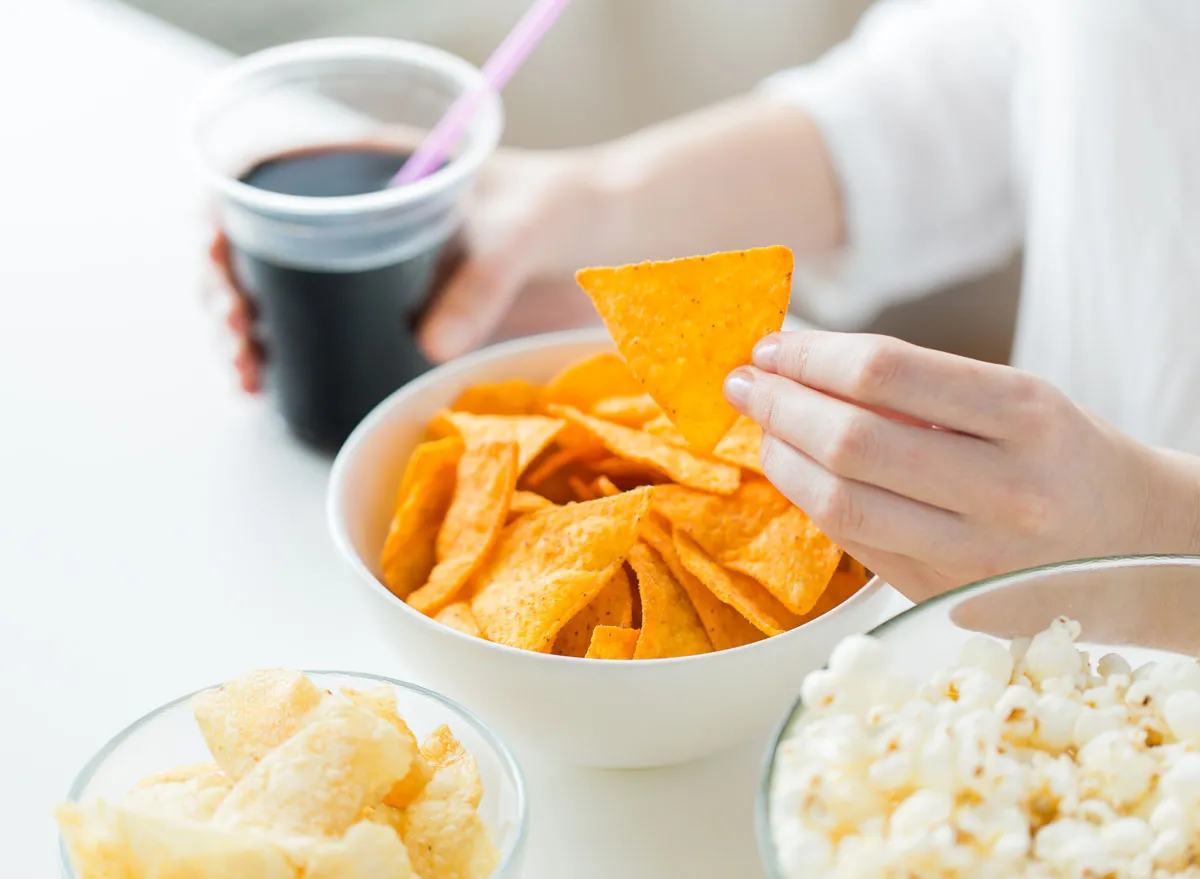We all age—there's no stopping it. Despite our best efforts to make ourselves look young and stay youthful, our bodies will start to wrinkle and grow grey hairs and our brains will (hopefully) be all the wiser over the years. Nevertheless, there are ways some of our actions on this earth can result in adding even more years to our lives, including what we eat. This is why it's important to eliminate any terrible eating habits that can age you faster, like regularly eating ultra-processed foods.
Ultra-processed foods are exactly what you think they are—packaged food products that have a long list of unrecognizable ingredients, a long shelf life, and typically don't provide your body with a ton of nutritional substance. Sure, these foods are a tasty treat once-in-a-blue-moon (like scarfing down a bag of chips after a long hike, no judgment). But when it comes to setting holistic, healthy habits for yourself that can help you live a long life, eating ultra-processed foods on the regular can certainly age you faster—and there are even studies to prove it.
The dangerous effects ultra-processed foods have on your body
"Many physical, mental, emotional, and behavioral distresses can be traced back to processed foods," says Dr. Joan Ifland, PhD, MBA, FACN, founder of The Food Addiction Reset. "They've been shown to diminish cell function and are associated with aging symptoms like brain fog, fatigue, bloating, depression, high blood pressure, joint pain, and more."
According to a study done by researchers through the University of Navarra in Pamplona, Spain, and again referenced in a study published in the American Journal of Clinical Nutrition, eating ultra-processed foods have been linked to accelerated shortening of telomeres, which are cells in the body that shorten with age, as well as cell aging.
"Processed foods have been shown to interfere with major biological systems in our bodies," says Dr. Ifland. "Because medical professionals are generally unaware of the extent of harmful effects of processed foods, they ascribe the distress of processed food-related impairment to aging."
RELATED: Get even more healthy tips in your inbox by signing up for our newsletter!

More specifically, Dr. Ifland mentions different ways regularly eating ultra-processed foods can cause inflammation in the body, irregularities in hormones, alter brain function, create issues with blood circulation, and have even been linked to some cancers.
An analysis of 20 studies from the Nutrition Journal, which evaluated over 334,000 participants, also linked high consumption of ultra-processed foods with even more diseases including cardiovascular disease, cerebrovascular disease, hypertension, metabolic syndrome, irritable bowel syndrome, adolescent asthma, postmenopausal breast cancer, and gestational diabetes. It's even linked to some mental health issues such as depression.
How to create healthy habit change in your life
When it comes to changing your routine and creating healthier habits, Dr. Ifland is clear—be gentle with yourself, and don't cut it out cold turkey.
"Promise yourself that you will go slow and be patient," says Dr. Ifland. "It takes months to build new food routines. Surprisingly, an essential skill is learning how to set boundaries with people who beg you to join them in eating processed foods."
Dr. Ifland points out that your environment plays a huge role in your dietary choices. If you are in an environment where constantly eating ultra-processed foods is normalized, it can be difficult to create healthier habits. She recommends looking for the "food triggers" in your environment and eliminating them when possible.
"Having processed foods in the house is a huge trigger," says Dr. Ifland. "[The] media is packed with triggers. Toxic people are also big triggers. Take your time just observing and then get help strategizing about how to slowly eliminate triggers from your environment."
She even recommends finding online groups—like social media communities—of like-minded people that can help motivate you and uplift your efforts to take care of your body. Social media can be a powerful tool in creating mindset change, so even following healthy dietitians (like members of our medical expert board) and unfollowing anyone that promotes unhealthy habits can make a huge difference in your physical and mental health.
"Research shows that falling off of a food plan is most likely related to being exposed to a food or stress trigger," says Dr. Ifland. "Give yourself permission to discover which of the many brain-calming activities you enjoy. This is a skill that builds over months, even years. Never give up!"
To get started, Dr. Ifland recommends choosing the best elimination method that works for you. Removing all processed foods at once is an option, or simply eliminating certain types of processed foods one by one. Look for foods with sugar, sweeteners, excessive salt, processed fats, food additives, or essentially any foods with a long list of chemical ingredients you don't understand.
"The place to start is [to accept] that 'Big Food' gives millions of people a severe addiction to multiple food-like substances hidden in our food," says Dr. Ifland. "It can take years to deeply understand what it means to have been given a severe addiction against our will, without our knowledge, and with the complicity of our government."
By swapping out ultra-processed foods in your diet with nourishing, wholesome foods with good-for-you ingredients, you have a higher probability of living an even longer, healthier life. For tips on how to get started, check out our list of the 9 Healthy Eating Habits to Live Over A Century, Say Dietitians.
The #1 Worst Eating Habit That Ages You Faster, Says Expert — Eat This Not That - Eat This, Not That
Read More

No comments:
Post a Comment